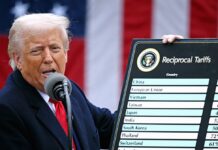Nadia Owusu, 39, was born in Dar es Salaam, Tanzania, and raised in Italy, Ethiopia, England, Ghana and Uganda, and lives in New York. She moved there aged 18 to attend Pace University and earned her master’s in creative nonfiction at the Mountview residency programme, where she now teaches. Her first book, a memoir called Aftershocks (Sceptre), explores trauma, race and belonging as Owusu charts her peripatetic youth and the pain of being abandoned by her Armenian-American mother when she was two, and then losing her beloved Ghanaian father to cancer when she was 13. She won the Whiting award for emerging writers in 2019 and has just been appointed director of storytelling at Frontline Solutions, a US black-owned consulting firm that helps social change organisations to define their goals.
The book connects geographical and emotional upheaval. “I have lived in disaster and disaster has lived in me”, as you put it.
When I was seven and living in Rome with my father, my mother came to visit on the same day I heard that there had been an earthquake in Armenia [where her mother’s family was from]. I heard on the radio that a whole city had been destroyed and that a lot of people’s homes had been destroyed. My mother was passing through with her new husband during a vacation from the US. She took me and my sister for a walk but then she was gone again and when she left it really shook me. My own private earthquake. I remember later asking my father what aftershocks were and he told me they were the “Earth’s delayed reaction to stress”.
[In the book] I wanted to show how our private disasters happen in the midst of larger forces that shape our lives without us realising – from natural disasters to war and genocide and terrorism.
Did you know why your mother had abandoned you?
My father didn’t like to talk about it – he told me that she had her own trauma so it was difficult for her to be there for us. I re-established contact with her in my late 20s and we touched on it – she said she was going through a really hard time and the relationship with my father had deteriorated and she thought my father could give me a better life.
The book is an exploration of trauma.
I wrote Aftershocks as a way to process trauma – my own and intergenerational trauma. I wanted to try and understand how it affects people and communities – for example, I thought about the context in which my mother was making decisions, coming from a family with genocide in its background. A big part of writing this was to confront the grief of losing [my parents] and the loss of all of my homes and the sadness I carried with me. As I processed my grief and worked to understand the collective trauma of colonisation and the Armenian genocide, it helped me to extend more compassion. I realised that a lot of stories I’d been given about the places that my family came from were incomplete or not the whole truth. It was important to me to interrogate the narratives I’d been given.
You also explore identity.
Most of my life I had this sense of really wanting to belong. Part of that is because I am what people call a “third-culture” kid. This sense of not belonging was heightened by the fact we moved around so much – my father worked for a UN agency and it was his job to respond to crisis, from famine to war – so we moved to a different country every few years. That was destabilising and I was trying to figure out who I was in these new places – as soon as I’d made new friends, it was time to leave again.
There’s a moving section where you listen to John Coltrane during a period of depression.
My father was a jazz lover and recommended I listen to him, but I never really did until I was in my 20s and found myself drawn to avant-garde music. Now I’m married to a jazz musician, Seth; we got married during the pandemic in December in a town hall in New York with no guests and just the kind people who worked there as our witnesses. The next day we had a celebration over Zoom. We met at a jazz jam session.
What are you working on at the moment?
A novel now. It’s engaged with some of the same questions about identity, family and the meaning of home, but the main character is not me. I felt like I wanted to work on something completely different.
Which writers have inspired you?
Audre Lorde, Toni Morrison, Tsitsi Dangarembga all had an impact and I return to their writing a lot. My father was also a writer – he wrote poetry. I’d go into his office and lie on the floor and write illustrated stories and give them to him for feedback. He would tell me Ashanti bedtime stories. A lot of African American writing is of an oral nature, call and response and repetition, and I tried to evoke that in the language and refrains [in the book].
What books are on your bedside table?
The African Lookbook by Catherine McKinley – a gorgeous photo history of African women. I’m very excited to read Milk Blood Heat by Dantiel W Moniz. I’ll soon be reading The Prophets by Robert Jones Jr and Detransition, Baby by Torrey Peters.
What kind of a reader were you as a child?
I read really widely; everything from The Baby-Sitters Club and Sweet Valley High to Jane Austen. I also discovered Zora Neale Hurston and Toni Morrison when I was young. As we moved around a lot there would be a period when I didn’t have any friends – and books kept me company.
• Aftershocks by Nadia Owusu is published by Sceptre (£16.99). To order a copy go to guardianbookshop.com. Delivery charges may apply








